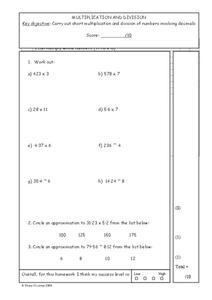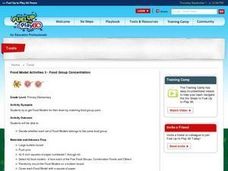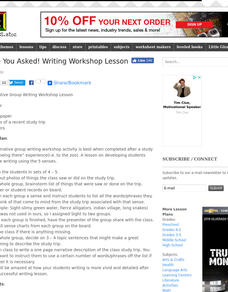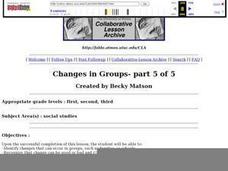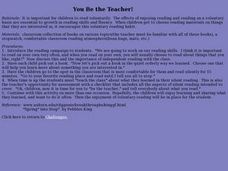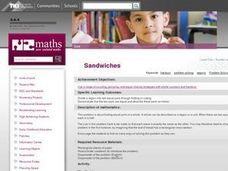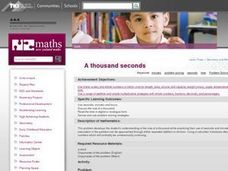Curated OER
Fractional Blocks
Students explore the concept that fractions can also be considered a ratio. They discover that the fraction bar can be read as "out of." Students practice basic multiplication facts and use patterns to find fractions of shapes.
Curated OER
Decimals
In this decimals worksheet, students solve and complete 10 various types of problems. First, they multiply or divide each pair of decimals given. Then, students circle an approximation to each given decimal problem listed at the bottom.
Curated OER
Paper or Plastic
Students practice throwing and catching skills with plastic grocery bags.
Curated OER
Women in Science
High schoolers examine obstacles faced by women throughout the world. They gather ask-an-expert websites, propose leading questions, and communicate with real female scientists.
Curated OER
Research Cruise Word Problems Lesson Plan
Students explore life onboard the NOAA Research Vessel Ronald H. Brown and practice basic arithmetic by completing word problems.
Curated OER
The Importance of Groups
Students discuss why groups are important and why humans go through daily life performing group activities.
Curated OER
Research Cruise Word Problems
Students examine life aboard the NOAA research vessel, Ronald H. Brown. They complete word problems related to the vessel, and then create three problems of their own.
Curated OER
Recycling and Reusing
Learners complete the associated worksheets as they investigate ways to recycle and reuse common objects. They share ideas on reusing objects while practicing listening, speaking and note-taking skills.
Curated OER
Cups and Cubes
Third graders explore the use of cups and counters as a model to analyze the effects of operations. They create and use a rule to create a sequential pattern and use cups and cubes to model the relationship.
Curated OER
Butterfly Lifecycle
First graders examine diagrams of butterflies printed from the stated website and follow directions to make a model of the butterly life cycle. They then participate in a WebQuest to observe the life cycle stages of a butterfly.
Curated OER
Insect Biology and Ecology: A Primer
Students explore insects and closely related organisms. They examine the growth and development of a lady beetle. Students classify insects and organize them. They investigate pest management.
Curated OER
Food Group Concentration
Students play a game of concentration using various foods to make matches. A match consists of foods from the same food group or combination foods that contain the same combination of food groups.
Curated OER
Legs in the Barn
Students listen to the problem being read. They then brainstorm possible approaches and are encouraged to plan ways of recording their work so that others examine what they have done and share their findings.
Curated OER
Basketball Caps
Students work on a problem, individually or in pairs. They are asked questions that focus on average. They discus that the average number represents an equal redistribution , rather than just being able to state the rule. They write...
Curated OER
The Clumsy Tiler N (Fractions)
Students explore patterns and geometric sequencing. Students devise and use problem solving strategies to explore situations mathematically. Students solve real life problems. They demonstrate, with cardboard pieces, fraction and...
Curated OER
Multiples of a
Sixth graders use problem solving strategies to evaluate linear expressions by substituting values. They substitute values for the letters in their names before applying the concept to other words. They complete worksheets in which they...
Curated OER
Sense You Asked!
Fourth graders, in groups, brainstorm words that relate to the 5 senses after going on a field trip. The groups collect their words and create a piece of writing about the trip.
Curated OER
Changes in Groups
Students identify changes that can occur in groups and recognize whether change can be good or bad.
Curated OER
Why Care About Amphibian Population Decline and Malformations?
Students examine the reasons for preserving wildlife. They look at reasons for amphibian malformations and write an essay about the ethical issues that this brings up. They listen to the teacher read quotes about extinction and how the...
Curated OER
You Be The Teacher
Students create their own math problems with one restriction, the answer the teacher gives them must be kept in a sealed envelope. They may make up any kind of problem they like.
Curated OER
Points
Students listen to Gill's story and determine how many number points she has. They then find the number of points their own name has and get into groups where all the name points are the same.
Curated OER
Sandwiches
Students are introduced to the problem by thinking of all the ways 2 of their classmates could share a peanut butter sandwich. In pairs, students work describing their ideas. They then keep a record of all the different ways they find...
Curated OER
Visiting Grandma
First graders investigate the aspect of time, including days of the week using a calendar. They use problem solving strategies and a monthly calendar to find a solution to the problem.
Curated OER
A thousand seconds
Students use seconds, minutes, and hours. They then discuss the size of a thousand. After that they read time in digital or analogue form.



